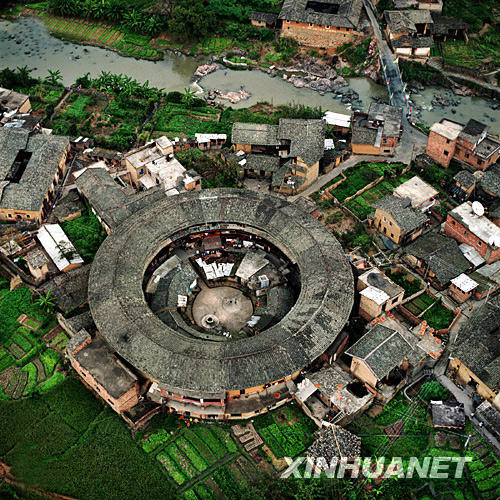
Tulou, the unique residential architecture of Fujian Province in southeastern China is inscribed on the UNESCO's World Heritage List Sunday during the 32nd session of the World Heritage Committee that is taking place in this eastern Canadian city Quebec. The photo is taken in October, 2002. [File Photo: Xinhua]
One more Chinese property was inscribed on the UNESCO's World Heritage List Sunday during the 32nd session of the World Heritage Committee that is taking place in this eastern Canadian city Quebec.
The 21 members of the committee agreed to add Tulou, the unique residential architecture of Fujian Province in southeastern China, on the World Heritage List as a cultural site, bringing the total number of Chinese properties on the list to 36.
Built from the 11th century to the 20th century in the mountainous areas across Fujian and neighboring provinces, the Tulou buildings were aimed at meeting the requirements of a whole clan to live together. They also serve other functions such as defense.
A Tulou building usually consists of rammed earth outer wall and internal wooden framework. Its unique structural form and ingenious interior design highlights the interdependent relation between clan members who live inside and demonstrates the development process of their life style.
In layout, the buildings nestled among hills and streams are harmonious with nature, reflecting Chinese traditional architectural designs, the Fengshui practices and the concept of unification between man and nature.
In addition, the Tulou buildings have nurtured local ways of production and lifestyles and fostered colorful intangible cultures.
In recommending the inscription of the Tulou buildings, ICOMOS, the professional evaluation institution of the World Heritage Committee, praised their breath-taking magnificence, unique and exquisite style as well as their durable and ingenious structure, saying they present a unique charm and outstanding universal value.
Starting from Sunday, members of the World Heritage Committee are examining the nominations of a total 47 cultural and natural sites submitted by 41 countries for inscription on UNESCO's World Heritage List.
UNESCO's 1972 Convention on the Protection of the World Cultural and Natural Heritage now protects 851 properties of " outstanding universal value," including 660 cultural, 166 natural and 25 mixed properties in 141 States Parties.
The 32nd session of the World Heritage Committee opened July 3 and will last until July 10.
During the session, the committee will also review the state of conservation of the 30 World Heritage sites inscribed on the List of World Heritage in Danger and may decide to add new sites to that list of properties whose preservation requires special attention.